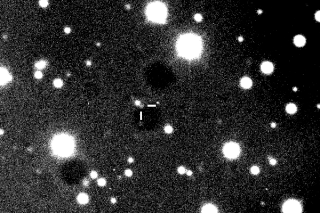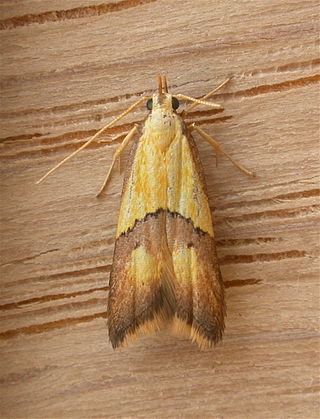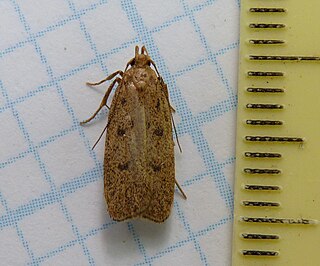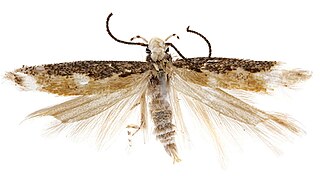
In Classical Greek mythology, Taygete was a nymph, one of the Pleiades according to the Bibliotheca (3.10.1) and a companion of Artemis, in her archaic role as potnia theron, "Mistress of the animals", with its likely roots in prehistory. Mount Taygetos in Laconia, dedicated to the goddess, was her haunt.

Taygete, also known as Jupiter XX, is a retrograde irregular satellite of Jupiter. It was discovered by a team of astronomers from the University of Hawaii led by Scott S. Sheppard, in 2000, and given the temporary designation S/2000 J 9.

The Lecithoceridae, or long-horned moths, are a family of small moths described by Simon Le Marchand in 1947. Although lecithocerids are found throughout the world, the great majority are found in the Indomalayan realm and the southern part of the Palaearctic realm.

Dichomeris is a genus of moths in the family Gelechiidae erected by Jacob Hübner in 1818.

Helcystogramma is a genus of moths in the family Gelechiidae. The genus was erected by Philipp Christoph Zeller in 1877.

Glyphidocera is a genus of moths in the family Autostichidae.

Taygete is a genus of moths in the family Autostichidae.

Thiotricha is a genus of moths in the family Gelechiidae, subfamily Thiotrichinae.

Eudonia is a large and widespread genus in the grass moth family (Crambidae), subfamily Scopariinae. There is no common name for the roughly 250 species placed here; new species are still being described regularly. Although the genus was proposed early in the 19th century, many of these moths were for a long time retained in Scoparia, the type genus of the subfamily and a close relative of Eudonia. A few small genera have been proposed for separation from Eudonia, but given the size of this group this is not particularly convincing; thus, all are retained here pending a comprehensive phylogenetic review.

Lecithocera is a genus of moths in the lecithocerid subfamily Lecithocerinae. The genus was erected by Gottlieb August Wilhelm Herrich-Schäffer in 1853.

Cosmopterix is a large genus of moth in the family Cosmopterigidae.
Dynatocephala is a genus of moths belonging to the family Tortricidae.

The Symmocinae are a subfamily of moths in the superfamily Gelechioidea. These small moths are found mainly in the Palearctic and Africa.

Gelechiinae is a subfamily of moths in the family Gelechiidae. It was described by Henry Tibbats Stainton in 1854.
Taygete sphecophila is a moth in the family Autostichidae. It was described by Edward Meyrick in 1936. It is found in Trinidad.
Taygete consociata is a moth in the family Autostichidae. It was described by Edward Meyrick in 1914. It is found in Guyana.
Taygete balsamopa is a moth in the family Autostichidae. It was described by Edward Meyrick in 1923. It is found in Amazonas, Brazil.
Taygete barydelta is a moth in the family Autostichidae. It was described by Edward Meyrick in 1923. It is found in Pará, Brazil.
Taygete citranthes is a moth in the family Autostichidae. It was described by Edward Meyrick in 1923. It is found in Pará, Brazil.
Taygete notospila is a moth in the family Autostichidae. It was described by Edward Meyrick in 1923. It is found in Amazonas, Brazil.











